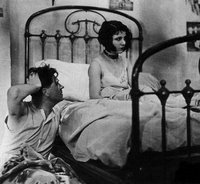
1993, US, directed by Jonathan Demme
It's striking that twelve years after Philadelphia was released, the notion of a perfectly ordinary man who simply happens to be gay is something that the movies still haven't come to terms with: while Andrew Beckett's (Tom Hanks) sexuality is critical to this story, in another sense the fact that he happens to have a male lover (Antonio Banderas) is portrayed as purely incidental, something that's as natural as breathing, whereas in most movies it's still framed as an 'issue'. The story is familiar: Andy Beckett is fired from his job, apparently because he is both gay and HIV positive, and the only lawyer in town who'll take on his case is Joe Miller (Denzel Washington), a former adversary and a homophobe to boot. On its own terms - major Hollywood movie tackling a genuinely emotive subject - Philadelphia does a decent job: it's simply unrealistic to expect a major studio to plunge millions of dollars into a movie like this and have the stars go to bed with each other. Soft-peddled it may have been, but it also got people talking in ways that they weren't accustomed to, and that, perhaps, is enough to expect from the entertainment industry. Tom Hanks handles his part with skill, and he makes the point, unmistakably, that one's sexuality and one's common decency are two entirely separate things (and not mutually exclusive); Denzel Washington is also solid, conveying some of the feelings of prejudice that even the most apparently open-minded among us occasionally mull over. Perhaps the most striking aspect of Philadelphia as an 'AIDS film' more than a decade on is the way in which AIDS is now a disease which is seen as an international - and especially African - public health issue, rather than simply as a 'gay plague' that carries a rapid death sentence (something that is less and less true in the West).









